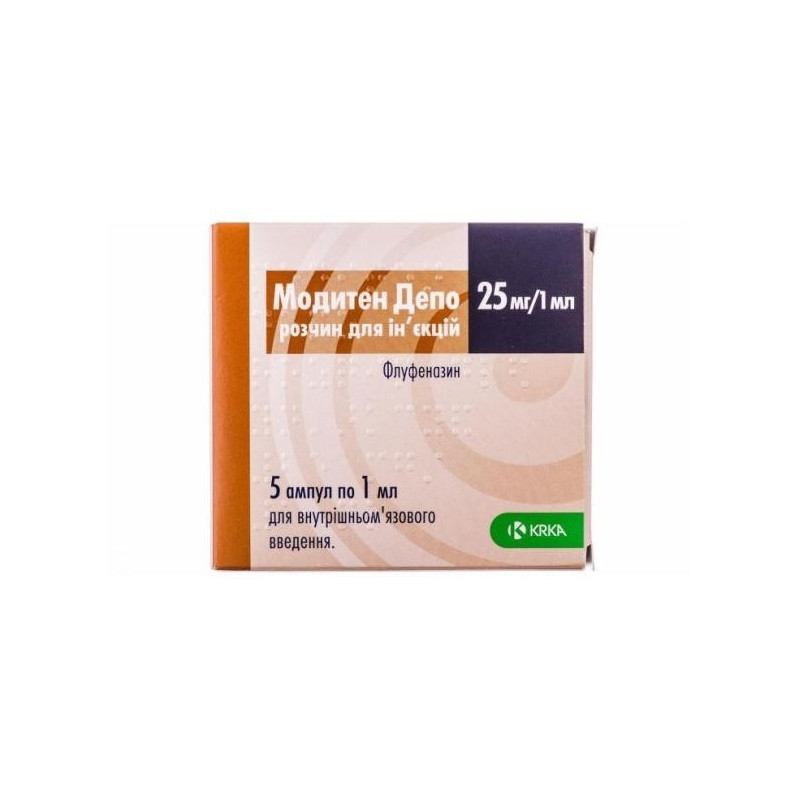



 All payments are encrypted via SSL
All payments are encrypted via SSL
 Full Refund if you haven't received your order
Full Refund if you haven't received your order
Injection
1 ml solution for injection contains fluphenazine decanoate 25 mg.
5 pieces
MODITEN-DEPO is a long-acting antipsychotic agent (neuroleptic). It has a weak antiemetic effect. Eliminates anxiety and irritability, hallucinations and delusions. The antipsychotic effect is due to the blockade of the dopamine D2 receptors of the mesolimbic and mesocortical system. Sedative effect (moderately expressed and observed when used in high doses) is due to the blockade of adrenoreceptors of the reticular formation of the brain stem; antiemetic effect - blockade of dopamine D2-receptors of the trigger zone of the vomiting center; hypothermic action - blockade of dopamine receptors of the hypothalamus. Unlike other derivatives, phenothiazine is characterized by a stronger effect (it is 25 times more effective than neuroleptic activity than chlorpromazine) and less pronounced extrapyramidal and somatic disorders. Especially effective in malignant nuclear (hebephrenic, catatonic, early paranoid form) and long-term current schizophrenia. In the form of decanoate (solution in oil) has a long-term effect (gradual release of the drug) - the effect lasts up to 1-2 weeks or more (depending on the dose).
Paranoid states, hallucinations, fear, aggressiveness; agitated state of the weak; arousal, emotional disturbances (in older people). Chronic forms: schizophrenia (all forms), psychosis, depressive-hypochondria syndrome, neurotic states accompanied by fear, nervous tension.
Hypersensitivity, severe cardiovascular diseases (decompensated heart failure, severe hypotension), pronounced suppression of the function of the central nervous system and comatose states of any etiology; brain injuries, progressive systemic diseases of the brain and spinal cord. Pregnancy, lactation period, children under 12 years of age (for fluphenazine decanoate). With caution - alcoholism (increased susceptibility to hepatotoxic reactions), pathological changes in the blood (impaired blood formation), breast cancer (as a result of phenothiazine-induced prolactin secretion, the risk of disease progression and resistance to treatment with endocrine and cytostatic drugs), closed-angle glaucoma, and hypoplasia increases resistance to treatment. with clinical manifestations, hepatic and / or renal failure, gastric ulcer and duodenal ulcer and (in the period of exacerbation); diseases associated with an increased risk of thromboembolic complications; Parkinson's disease (extrapyramidal effects are enhanced); epilepsy, history of epileptic seizures; myxedema; chronic diseasesaccompanied by respiratory failure (especially in children); Reye's syndrome (increased risk of developing hepatotoxicity in children and adolescents); cachexia, vomiting (the antiemetic effect of phenothiazines may mask vomiting associated with an overdose of other drugs), old age.
Dyskinesias (including tardive dyskinesia), susceptibility to epileptiform seizures, neuroleptic malignant syndrome (hyperthermia, akinesia, autonomic lability, clouding of consciousness, coma), tachycardia, reduction of blood pressure, urinary retention, constipation, violation of secretion, exocrinum, opacrine dysfunction, clouding of consciousness, coma), tachycardia, decreased blood pressure, urinary retention, constipation, impaired consciousness, coma), tachycardia intraocular pressure, photosensitivity, allergic reactions, galactorrhea, dysmenorrhea, psychomotor retardation; seborrhea; orthostatic hypotension, agranulocytosis, esinophilia, leukopenia, hemolytic anemia, pancytopenia.
It should not be combined with the combined drugs, which include reserpine. Undesirable long-term combination with analgesics and antipyretic (possible development of hyperthermia). With simultaneous use with other drugs that have a depressant effect on the central nervous system (drugs for anesthesia, narcotic analgesics, ethanol and preparations containing it, barbiturates, tranquilizers, etc.) may increase depriving effect, as well as respiratory depression. Prescription in conjunction with tricyclic antidepressants,maprotiline or MAO inhibitors increase the risk of developing neuroleptic malignant syndrome; with drugs for the treatment of hyperthyroidism increases the risk of agranulocytosis; with other drugs that cause extrapyramidal reactions, increases the frequency and severity of extrapyramidal disorders; with antihypertensive drugs increases the severity of orthostatic reduction of blood pressure. Weakens the vasoconstrictor effect of ephedrine. Antacids, anti-Parkinsonian, Li + preparations may interfere with absorption. Dr. hepatotoxic drugs - the risk of hepatotoxicity. May mask some manifestations of ototoxicity (tinnitus, dizziness) of ototoxic drugs, especially antibiotics. During treatment, the administration of epinephrine should be avoided (due to the possibility of distorting the effect of epinephrine and further reducing blood pressure). Reduces the effectiveness of antiepileptic drugs. It reduces the anti-parkinsonian effect of levodopa (due to the blockade of dopamine receptors), as well as the effects of amphetamines, clonidine and guanetidine. Enhances the anticholinergic effects of other drugs, with its own antipsychotic effect may be reduced.
In the dark place at a temperature of 8-25 ° C.
